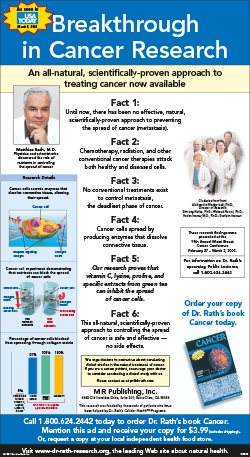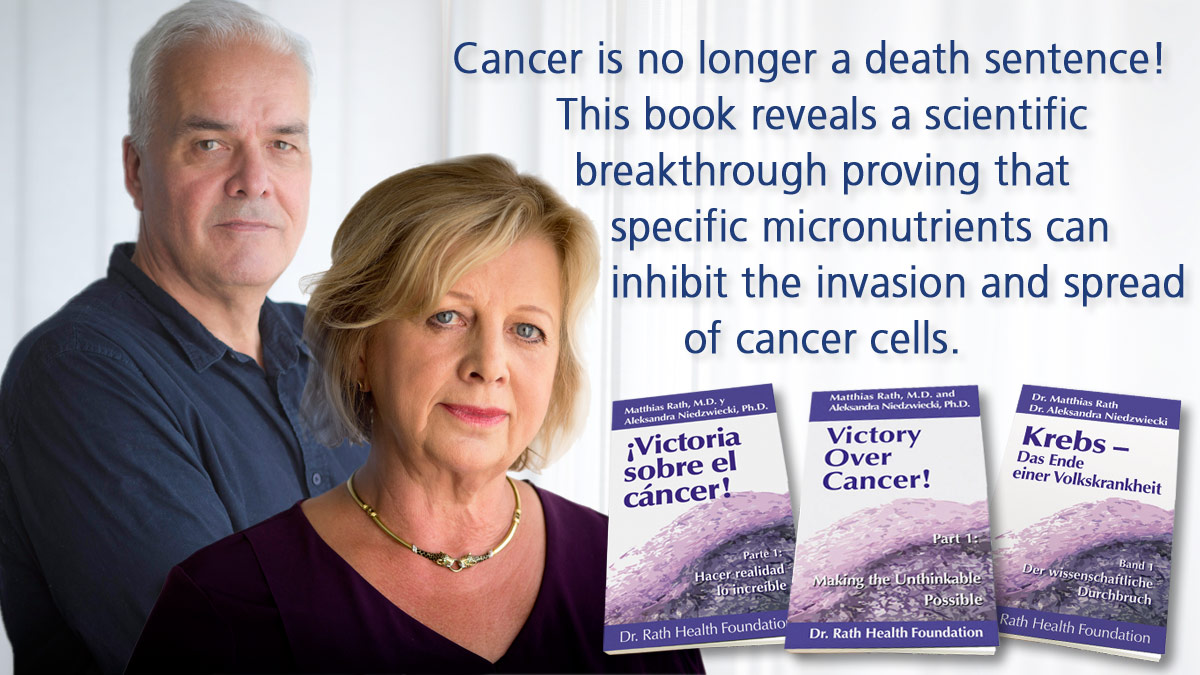- Have any questions? Contact us!
- info@dr-rath-foundation.org

Religious Leaders Warn Of Pharmaceutical Business Interests Behind Current Pandemic
May 11, 2020
‘Overwhelming Evidence’ Supports Vitamin D’s Immune Function Benefits
May 15, 2020New Study Provides Further Support For Fighting Cancer With Vitamin C

A new study published in the journal Nature Communications suggests that adding high-dose vitamin C to a diet that mimics fasting is effective in treating aggressive cancer. Carried out by scientists from the University of Southern California (USC) and the IFM Cancer Institute in Milan, the study found the treatment delayed tumor progression in multiple mouse models of colorectal cancer. In some mice it was successful in bringing about regression of the disease. The study provides further confirmation that natural cancer therapies based around the use of vitamin C can provide effective, safe alternatives to toxic conventional treatments such as chemotherapy.
In recent years there has been increased interest in calorie reduction and fasting as interventions to help delay the ageing process. Researchers have claimed beneficial effects in diabetes, high blood pressure, and other health problems. Reporting on this latest cancer study, a press release on the USC website states that at least five clinical trials are currently investigating the effects of diets that mimic fasting in combination with various cancer drugs. However, the use of drugs in these studies flies in the face of their decades-long failure to reverse the cancer epidemic. It also fails to take account of the fact that, as demonstrated in numerous studies published by scientists at the Dr. Rath Research Institute, drug-free micronutrient-based approaches now exist that can block all key mechanisms that make cancer a deadly disease.
The road towards the natural control of cancer

On 8 March 2002, Dr. Rath and his research team published an announcement about their cancer breakthrough in the USA Today newspaper
Following decades of essentially being ignored by conventional medicine, there is growing interest in the use of vitamin C and other micronutrients as effective and safe treatments for cancer. The event that sparked this interest came in early 2002 when, in findings presented at the 19th Annual Miami Breast Cancer Conference in Florida, Dr. Rath and his research team announced a revolutionary breakthrough in the natural control of cancer. Proving that a micronutrient combination consisting of vitamin C, lysine, proline, and specific extracts from green tea can inhibit the spread of cancer cells, their work provided the impetus for numerous other researchers worldwide, including those working in government institutions, to begin studying the use of micronutrients for controlling cancer.
Subsequently, a key step towards ‘official’ recognition of the use of vitamin C against cancer came in a study published in the prestigious Proceedings of the National Academy of Sciences of the United States of America in September 2005. Authored by scientists at the U.S. government’s National Institutes of Health (NIH), the world’s largest research institute, the study confirmed that vitamin C selectively kills cancer cells. This is in marked contrast to chemotherapy drugs which, through intoxicating the entire body, kill cancer cells and billions of healthy cells alike. The NIH researchers wrote that their findings gave plausibility to the use of intravenous vitamin C in the treatment of cancer.
The ongoing work conducted at the Dr. Rath Research Institute has since proved that a synergistic group of micronutrients including vitamin C can inhibit the invasion of more than 40 types of human cancer. When used in combination these micronutrients are able to inhibit cancer cell invasion and metastasis, inhibit cancer cell multiplication and tumor growth, inhibit the formation of new blood vessels that feed tumors (angiogenesis), and induce the natural death of cancer cells (apoptosis). Significantly, there is no drug anywhere in the world that can effectively and safely achieve all of these things. As Dr. Rath and Dr. Niedzwiecki observed in their 2011 book, ‘Victory Over Cancer’, effectively blocking even one of these mechanisms can be sufficient to control cancer.
Making cancer a manageable disease
Most recently, in January 2020, the U.S. government’s National Cancer Institute (NCI) published a long article on intravenous high-dose vitamin C in cancer therapy. Examining the history and use of vitamin C in the treatment of cancer, the writers concluded that “given the current high financial cost of new cancer drugs, it seems rational to improve the effectiveness of current therapies by studying their clinical interactions with vitamin C.” They added that in their view, “the implementation of this treatment paradigm could provide benefit to many cancer patients.”
As Dr. Rath described in his recent Open Letter, the publication of this NCI article signified ‘Armageddon’ for the pharmaceutical investment business. Currently making more than $100 billion a year from sales of patented chemical drugs for cancer, the investors behind this business realize that acceptance of vitamin C’s role in the fight against cancer is the beginning of the end for drug-based treatments. Once doctors and patients everywhere learn about the synergistic effects of using lysine, proline, green tea extracts, and other non-patentable micronutrients with vitamin C, not only will cancer eventually become a manageable disease, the pharmaceutical investment industry’s ability to profit from the misery and suffering of cancer patients can be brought to an end. For millions of cancer patients and their families, the sooner this happens the better.




